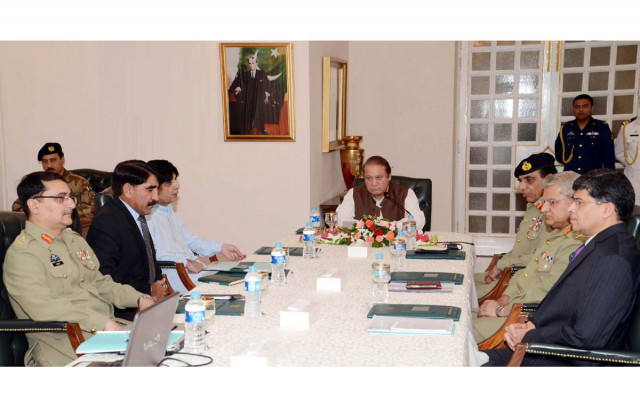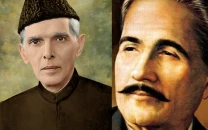Rare visit to NCA: Pakistan is not in an arms race, says PM
Nawaz assures nuclear arsenals are in ‘safe hands’.

Prime Minister Nawaz Sharif chairing a high level meeting with senior security and intelligence officials on October 4, 2013. PHOTO: PID
Prime Minister Nawaz Sharif paid a rare visit to the country’s nuclear installations on the outskirts of the capital on Friday and spent the whole day with the military leadership. He also met Chief of Army Staff General Ashfaq Parvez Kayani to discuss the appointment of a new chairman Joint Chiefs of Staff Committee.
The premier visited the National Command Authority (NCA) accompanied by army chief Ashfaq Parvez Kayani, outgoing Chairman Joint Chiefs of Staff Committee General Khalid Shamim Wynne, Finance Minister Ishaq Dar, Director General Strategic Plans Division Lt Gen (retd) Khalid Ahmed Kidwai and other senior military officers and scientists.
The prime minister made it clear that Pakistan was not engaged in an arms race with any country and reiterated his resolve for peace and stability in the region, according to a press release.
He added that Pakistan’s nuclear arsenals ‘are in safe and secure hands’, and that “Pakistan’s strategic capability will continue to follow its policy of credible minimum deterrence.”
“Pakistan is a peace-loving country and it harbours no aggressive designs against any country, but will maintain minimum nuclear deterrence,” he said.
While the prime minister laid stress on minimum deterrence, he also said that nuclear technology was Pakistan’s basic right to meet its growing energy requirements.

“Acquiring civil nuclear technology is our fundamental right to meet our requirements,” he said. “National integrity and sovereignty of Pakistan will be ensured at all costs.”
The prime minister was also briefed on the nuclear programme and installations, and given a demonstration of the state-of-the -art connectivity of countrywide strategic assets – an exclusive network ensuring effective control over strategic assets by the NCA.
He was also briefed by the commander of the Army Strategic Force Command on an indigenously developed strategic system, designed to facilitate decision making at the NCA.
Analysts believe frequent visits to the security installations would show the world that the civil-military relationship in Pakistan was improving.
Lt Gen (retd) Talat Masood said the endeavour was ‘unusual’. “The prime minister and military leadership seem to be in constant touch which is extraordinarily laudable,” he told The Express Tribune.
It was the prime minister’s first visit to the NCA but third in a row to any strategic plan’s department since he came to power as a result of the May 11 elections.
“Whether its war on terror, or tensions on the Line of Control or nuclear command and national security, our civil and military leaderships seem to be on the same page. This is allowing the political government to assert its powers in the larger interest of the country,” Masood said, adding that it also asserted the chief executive’s control in foreign policy matters.
Meets CJCSC and COAS
Sources told The Express Tribune that the prime minister held a meeting with the army chief to discuss key issues pertaining to security, especially in the backdrop of the prevailing security situation. The appointment of a new CJCSC also came under discussion as General Wynne is due to retire later this month. Reports suggest that Lt Gen Haroon Aslam, currently the most senior general in Pakistan Army, is being considered for the post, apart from Chief of Naval Staff Admiral Asif Sandila.
Published in The Express Tribune, October 5th, 2013.



















COMMENTS
Comments are moderated and generally will be posted if they are on-topic and not abusive.
For more information, please see our Comments FAQ